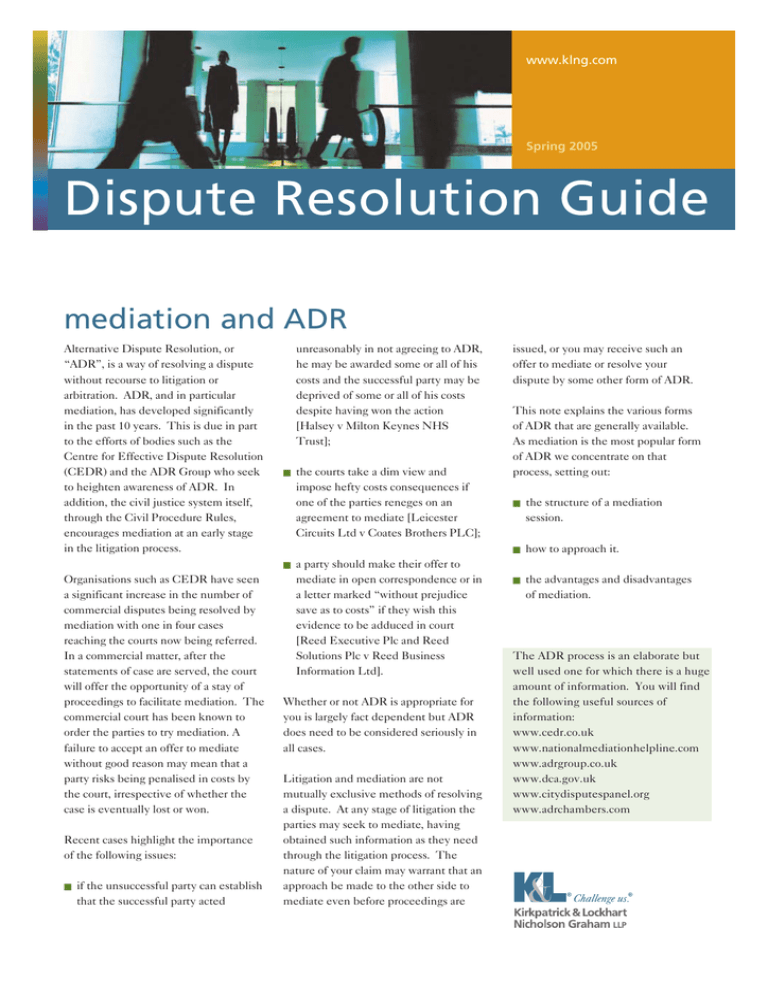
www.klng.com
Spring 2005
Dispute Resolution Guide
mediation and ADR
Alternative Dispute Resolution, or
“ADR”, is a way of resolving a dispute
without recourse to litigation or
arbitration. ADR, and in particular
mediation, has developed significantly
in the past 10 years. This is due in part
to the efforts of bodies such as the
Centre for Effective Dispute Resolution
(CEDR) and the ADR Group who seek
to heighten awareness of ADR. In
addition, the civil justice system itself,
through the Civil Procedure Rules,
encourages mediation at an early stage
in the litigation process.
unreasonably in not agreeing to ADR,
he may be awarded some or all of his
costs and the successful party may be
deprived of some or all of his costs
despite having won the action
[Halsey v Milton Keynes NHS
Trust];
I
I
Organisations such as CEDR have seen
a significant increase in the number of
commercial disputes being resolved by
mediation with one in four cases
reaching the courts now being referred.
In a commercial matter, after the
statements of case are served, the court
will offer the opportunity of a stay of
proceedings to facilitate mediation. The
commercial court has been known to
order the parties to try mediation. A
failure to accept an offer to mediate
without good reason may mean that a
party risks being penalised in costs by
the court, irrespective of whether the
case is eventually lost or won.
Recent cases highlight the importance
of the following issues:
I
if the unsuccessful party can establish
that the successful party acted
the courts take a dim view and
impose hefty costs consequences if
one of the parties reneges on an
agreement to mediate [Leicester
Circuits Ltd v Coates Brothers PLC];
a party should make their offer to
mediate in open correspondence or in
a letter marked “without prejudice
save as to costs” if they wish this
evidence to be adduced in court
[Reed Executive Plc and Reed
Solutions Plc v Reed Business
Information Ltd].
Whether or not ADR is appropriate for
you is largely fact dependent but ADR
does need to be considered seriously in
all cases.
Litigation and mediation are not
mutually exclusive methods of resolving
a dispute. At any stage of litigation the
parties may seek to mediate, having
obtained such information as they need
through the litigation process. The
nature of your claim may warrant that an
approach be made to the other side to
mediate even before proceedings are
issued, or you may receive such an
offer to mediate or resolve your
dispute by some other form of ADR.
This note explains the various forms
of ADR that are generally available.
As mediation is the most popular form
of ADR we concentrate on that
process, setting out:
I
the structure of a mediation
session.
I
how to approach it.
I
the advantages and disadvantages
of mediation.
The ADR process is an elaborate but
well used one for which there is a huge
amount of information. You will find
the following useful sources of
information:
www.cedr.co.uk
www.nationalmediationhelpline.com
www.adrgroup.co.uk
www.dca.gov.uk
www.citydisputespanel.org
www.adrchambers.com
Dispute Resolution
Forms of ADR
referred to as the “mini trial”.
There are a number of methods which
have become popular.
I
I
Conciliation
Used mostly in the employment
field, this process uses an
independent third party to
encourage negotiations between
disputing parties.
I
Executive Tribunal
This is a voluntary procedure
allowing both parties to a dispute to
present their case before senior
representatives or executives from
each party, together with a neutral
chairman who may be a mediator or
an expert. Thereafter, the tribunal
meets to negotiate settlement on a
realistic basis. It is sometimes
I
Early Neutral Evaluation
A neutral person is instructed by
both sides to evaluate the dispute
and offer an opinion. The opinion
will be a non-binding view of the
merits of each side’s case, which is
used to advance settlement
negotiations.
Adjudication/Expert
Determination
Submissions are made to a chosen
expert in the field for a decision,
which binds both parties. This is
commonly used in the construction
field, adjudication clauses now being
compulsory in construction contracts.
Under the Housing Grants,
Construction and Regeneration Act
1996, parties to a construction
contract entered into after 1 May
1998 may submit a dispute to an
adjudicator who can make a quick
decision which is binding on the
parties until overturned by a court or
arbitrator.
I
Mediation
This is a voluntary, private and nonbinding process in which a neutral
person (the mediator) assists the
parties to reach a negotiated
settlement. The mediator’s role is
more pro active than that of a
conciliator but a mediator does not
have power to make any decision or
award.
Benefits of mediation
I
I
I
2
Control
Resolving a dispute in this way
means that parties always control the
outcome. A mediator cannot impose
a decision unless agreement is
reached and signed off at the
conclusion of the mediation.
Management Tool
Being informal, flexible and
providing the possibility of an early
resolution, mediation is much more
suitable in situations where the
parties want to preserve a
commercial relationship.
Flexibility.
A mediation can be set up quickly
and in any location of the parties’
choosing. Discussions need not only
relate to the matters in dispute, but
SPRING 2005
can encompass any aspect of the
business relationship between the
parties. A mediator is able to
recognise and promote common
interests beyond the immediate
issues of the dispute, to the mutual
advantage of the parties. It thereby
preserves commercial relationships
and business confidentiality.
I
Confidentiality
The mediation agreement generally
provides that the process is
confidential and discussions are
conducted on a without prejudice
basis. Conversely, litigation can
often attract unwelcome publicity.
In short, a mediator can help craft a
settlement based on principled
negotiations using multiple options and
objective criteria, avoiding any previous
history of distrust or positional
bargaining.
Costs of
mediation
The mediator's fees are generally
charged on a sliding scale depending on
the sum in dispute. For claims up to £1
million, the mediation charges are
approximately £1,800 per day which
includes the mediator's preparation
time. For more complex claims
mediators tend to charge an hourly rate
which can be anything between £250400. There are no fixed rules, but
generally these fees are shared equally
between the parties.
www.klng.com
Structure of a mediation session
A mediation does not involve a series of
ad hoc negotiations. It is a structured
process. Notwithstanding the best
efforts of solicitors acting on behalf of
disputants in an adversarial system, they
never have the opportunity to evaluate
the problem in the same way as a third
party neutral.
I
The mediator will control the negotiations by a series of meetings with the
parties both jointly and individually, at
his discretion.
I
Case summaries
These are prepared by each party and
are sent to the mediator before the
mediation. He may also make contact
with the parties’ solicitors for
clarifying the issues and identifying
options for settlement.
clarification so that he is fully aware of
the issues.
I
Opening Session
The mediation will begin with an open
session with both parties present. The
mediator gives an introductory talk
explaining the process and his role.
The parties then have an opportunity
to make a statement presenting the
main elements of their case. This
opening statement may be made by
one of the parties to the dispute or
his/her solicitor.
I
Private Meetings
All meetings held in private with a
mediator are entirely confidential. No
information is passed on without the
specific consent of the party
providing it.
I
Joint Sessions
From time to time the mediator may
bring the parties together if
appropriate, either to expedite
negotiations and allow the parties to
deal directly with each other or to
finalise a possible settlement.
Shuttle Diplomacy
The parties retire to separate rooms and
are seen by the mediator in a series of
private meetings with a view to
Getting the best out of mediation
Mediation does not involve any crossexamination or presentation of evidence so preparation is less time consuming and expensive. However, each
party needs to have a clear idea of what
it wants to achieve during the course of
the mediation. Mediations begin slowly, generally with the parties putting
their case at its best and impressing the
mediator with their legal position.
However, the private sessions generally
become less formal and more productive as the day wears on. To be properly prepared and get the best out of the
mediation you should:
I
Gather all the information that you
need, including all expert evidence,
and counsel's opinions.
I
Make sure you have full authority to
settle.
I
Make sure all the facts of the case
are known and all the witnesses have
been seen and assessed as to how
well they will perform in giving
evidence.
I
Make a list of the strengths and
weaknesses of your case.
I
Identify any legal issues and obtain
such analysis as you need before the
mediation.
I
Send the mediator a sufficient
amount of information in advance so
that he is clear on the issues. Arange
to meet the mediator beforehand if
you think it necessary.
I
Work out your tactics. Consider
what information you will not want
to disclose to the other side.
I
Set out a list of the difficult
questions that you may want the
mediator to ask the other side.
I
How can you use the mediator to
your advantage? He can be a devil's
advocate, a problem solver or a
source of new ideas and approaches.
I
Prepare an evaluation of the best
possible outcome of a trial, as
compare to the worst possible
outcome. This will help you to be
realistic about what you want to
achieve. Just as importantly, you will
need to decide how you can
persuade the other side that you are
being realistic. To do this, avoid
emotive language unless you
sincerely have a problem on any
particular issue.
I
Avoid being too specific in your
SPRING 2005
3
Dispute Resolution
first opportunity that the parties
have to meet face to face. Getting to
know the personalities involved is
part of the educative process and
may be useful if the mediation fails
to achieve a settlement on the day.
demands especially early on in the
process. Keep an open mind and be
ready to explore new ideas.
I
Prepare your opening statement with
these matters in mind. Be clear
about what you want to achieve and
who is going to make the statement.
Often it may be beneficial for the
client to have an active participation
in the mediation and to make the
opening statement. It may be the
I
Arrive on time so that you are
focussed and sending the right
signals to the other side and be
prepared to stay late as mediations
often go on into the night.
I
Avoid brinkmanship and be
persistent. Many mediations go
through low points but often a
turning point can be achieved.
I
Mediation can be used alongside
litigation. Consider at what stage
mediation should be attempted.
If a mediation does not lead to a
settlement, do not despair. Often the
mediation can be re-convened at a later
date if both parties agree, or the parties are
The disadvantages of mediation
able to negotiate a settlement soon after.
Not all cases are suitable for mediation.
For example, mediation is not
suitable:-
We can help you assess what type of
claim is suitable for mediation and what
is not. Some parties may use mediation
to delay the issue of proceedings and
buy time. Others may seek to obtain
information during the course of a
mediation without any real desire to
settle.
I
Where there are no substanital issues
in dispute, such as a straightforward
debt claim where the debtor may
have no genuine interest in
settlement.
I
Where one of the parties seeks to
obtain publicity or a legal precedent.
I
Where a protective court order is
required.
I
Where one of the parties is seeking
to apply leverage.
Who to Contact
Kirkpatrick & Lockhart
Head of Dispute Resolution and Litigation (London Office) John Magnin
Nicholson Graham LLP
Specialist Groups
Arbitration
Banking & Pensions Disputes
Construction Disputes
Commercial Disputes
Elections
Employment Disputes
Insolvency Disputes
Insurance Coverage Disputes
Intellectual Property Disputes
Property Disputes
Securities Enforcement
Travel Disputes
Sports Disputes
Ian Meredith
Anne McCarthy
James Hudson
John Magnin
Piers Coleman
Paul Callegari
Antony Griffiths
Jane Harte-Lovelace
Dominic Bray
Jane Harte-Lovelace
Robert Hadley
Cynthia Barbor
John Magnin
imeredith@klng.com
110 Cannon Street
amccarthy@klng.com
London EC4N 6AR
jhudson@klng.com
www.klng.com
jmagnin@klng.com
pcoleman@klng.com
T: +44 (0)20 7648 9000
pcallegari@klng.com
F: +44 (0)20 7648 9001
agriffiths@klng.com
jharte-lovelace@klng.com
dbray@klng.com
jharte-lovelace@klng.com
rhadley@klng.com
cbarbor@klng.com
jmagnin@klng.com
Kirkpatrick & Lockhart Nicholson Graham is a combination of two limited liability partnerships, each named Kirkpatrick & Lockhart Nicholson Graham LLP, one
established in Delaware, USA, and one incorporated in England.
This publication/newsletter is for informational purposes and does not contain or convey legal advice. The information herein should not be used or relied upon in
regard to any particular facts or circumstances without first consulting a lawyer.
Unless otherwise indicated, the lawyers are not certified by the Texas Board of Legal Specialization.
Data Protection Act 1998 - We may contact you from time to time with information on Kirkpatrick & Lockhart Nicholson Graham
LLP seminars and with our regular newsletters, which may be of interest to you. We will not provide your details to any third parties.
Please e-mail cgregory@klng.com if you would prefer not to receive this information.
4
SPRING 2005
© 2005 KIRKPATRICK & LOCKHART NICHOLSON GRAHAM LLP. ALL RIGHTS RESERVED.



